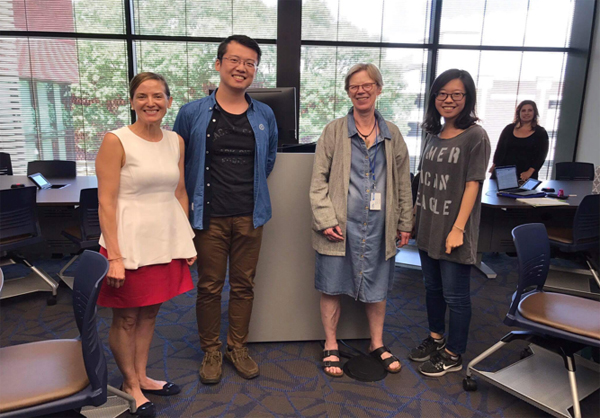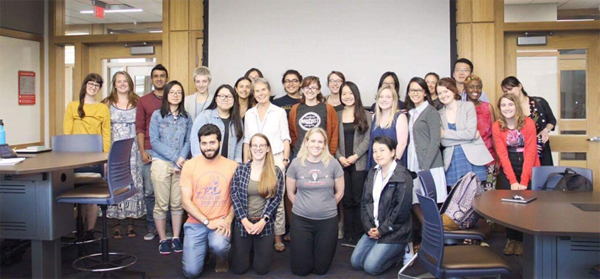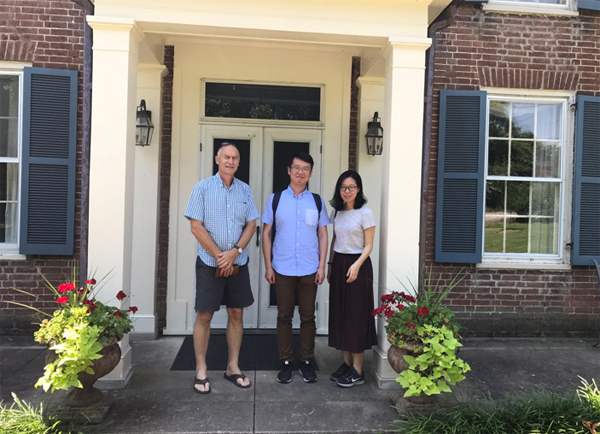An unforgettable experience at the LSA Linguistic institute 2017
by Sydney Wang
The Linguistic Society of America holds summer Linguistic Institutes every two years, which have become prestigious gatherings for linguistics students and scholars. As third year PhD students, Jackie Militello, Corey Huang and I will share our experience from this year’s, which was held over 4 weeks in July and August in Lexington, Kentucky.

From left to right: Jackie Militello, Corey Huang, Prof. Barbara Johnstone, Sydney Wang
Honestly, I was not fully prepared for this time-honored gathering due to my on-and-off three-month period of leave before the trip. So, before my departure, I imagined this trip as a vacation to make friends and explore Kentucky’s local culture, in which I was halfway right. I made amazing friends, talked to major scholars, and went on informative city tours. However, the Linguistic Institute indeed surprised me with its intensive courses and heavy workload required for each class. We were limited to a choice of four courses out of the large pool of courses provided, but it turned out four courses were sufficient to keep me occupied. Besides reading required articles before courses, and posting reading responses on Canvas (another course management platform like Moodle used at HKU), at least two assignments needed to be turned in for each course within four weeks. On Wednesdays, Saturdays and Sundays, when no courses were scheduled, we always had to make very hard decisions to choose to attend various workshops, seminars, or wonderful outdoor activities organized by the institute.
Jackie, on the other hand, had figured out the intensity of the Institute in advance: she reflected that “when I first saw the schedule online, I planned a schedule of full classes, every hour of every day. Even then, there were more that I wanted to take than I could fit in. When the registration opened, I was surprised to learn we could only register for four. I asked Kara Fleming (Linguistics PhD HKU 2015), from whom I heard about the Institute, about this and she said that 4 would be more than enough. That with the readings, the work and the socializing, I would have my plate full. She was right. I took four for credit and sat in on a few others, at the start.”
The four courses I enrolled in were Introduction to discourse analysis, Introduction to sociolinguistics, Language in culture, and Language and race. Jackie, Corey and I took the first three classes together, since they were centered on interrelationships between language, society and culture. These were taught by renowned scholars Prof. Barbara Johnstone, Prof. Penelope Eckert, and Prof. Michael Silverstein, respectively. It was exciting to get to know these major scholars as real people, and talk to them about how I wanted to use their work in my research.

Introduction to Sociolinguistics class photo
Although we talked about dropping one of the courses just to relieve our stress, we managed to meet all the deadlines in the end. The result turned out to be surprisingly rewarding, since all the lecturers gave us plenty of useful feedback on the submitted assignments. Receiving feedback on research ideas from so many world-class scholars was the highlight of the institute for all of us.

From left to right: Prof. Richard D. Schein, Corey Huang and Sydney Wang
The rich academic experience was not the only benefit to us during our stay in the Institute. On one of our days off, Corey and I embarked on a special city tour around Lexington, Kentucky, where the institute was hosted, with Prof. Richard Schein (from cultural geography) of the University of Kentucky, the host institution for the summer institute. Looking back on this outing, Corey reflected on how “In the course of that trip, Sydney and I learned a lot about how local and national histories have been shaping the urban and rural landscape of the town. We also sampled local food and drink and then got a peek inside Prof. Schein’s house at the end of the trip.”
Jackie also added that meeting other fellow graduate students and hearing about their interests and work was another highlight: “One student I met studied voice actors for cartoons, interviewing different actors to ascertain how they produced certain qualities or traits for each character. Another student looked at Indian phrases on Arab social media and how these were repurposed as semiotic resources. And given the many people in syntax, psycholinguistics, computational linguistics, historical linguistics, morphology, intonation, etc., I realized first-hand, the breadth and depth of the greater linguistic field.’

Prof. Penelope Eckert, Jackie Militello and friends
As a final note, special thanks go to Dr. Lisa Lim and Prof. Adam Jaworski for supporting me to attend this institute and facilitating my funding application, and my friends Scarlett and Cathy who cooked my meals. And I’m looking forward to reading Scarlett’s side of the story about the institute as a psycholinguistic researcher, which is also being published this month!

Our apologies, you must be logged in to post a comment.